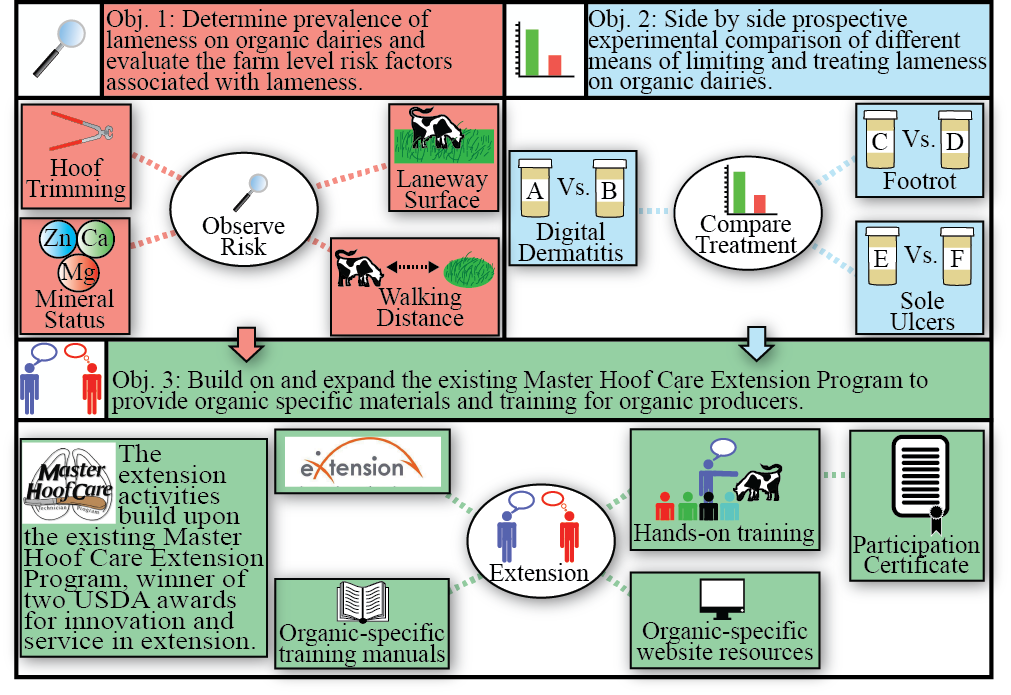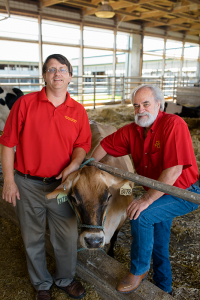Overview
In September of 2017 the United States Department of Agriculture, through the Organic Research and Extension Initiative, awarded Iowa State University College of Veterinary Medicine a four year grant to address lameness issues in organic dairy farms. This collaborative project will focus on key issues surrounding lameness and will aim to improve the health, welfare and profitability of organic dairy cows around the country. We are pleased that you have come to our website for more details and invite you to learn more about the project through these webpages. If you are interested in getting involved in the research project please be sure to visit the Get Involved page for more details and submission of your contact information.
Project Summary
Bovine lameness is a leading animal welfare concern and surpasses mastitis as the most costly clinical disease of dairy cattle. Despite the clear connection of lameness to welfare and profitability, there are very few resources available to organic producers interested in improving their prevention, management, or treatment of lameness. This project directly addresses two of the 2017 OREI Priorities, specifically the priority associated with advanced on-farm research to experimentation (RFA priority 1) and the priority related to the development and demonstration of educational tools for cooperative extension personnel (RFA priority 2). The goal of this proposal is to develop, validate and disseminate protocols, specific to organic dairy production systems and management, which aid organic producers in making management and treatment decisions related to lameness. The central hypothesis of the research portion of this integrated proposal is that the unique management practices on organic dairy farms necessitate a systematic evaluation of organic system specific risk factors and interventions. In the extension portion of the project the goal is to disseminate this information to the stakeholders and then to help them apply the information to their operation. The rationale that underlies the proposed research is that an understanding of organic specific lameness risk factors and treatment protocols will lead to improved recognition, prevention and management of lameness on organic dairies. The research proposed in this application is significant, because dissemination and application of the knowledge gained improves the economic sustainability of organic dairy farms while clearly benefiting the welfare of the cattle.

Why is monitoring and recording lameness important?
Lameness is a critically important health issue for dairy cattle due to it’s impact on welfare and productivity. Although USDA has announced the decision to withdraw the Organic Livestock and Poultry Practices (OLPP) final rule published on January 19, 2017, there is still significant industry interest in moving forward with implementation of these standards. In the original language of the OLPP, AMS added a new §205.238(a)(8) that required organic producers to actively monitor and document lameness within the herd. The requirement for producers to create a plan for monitoring and recording instances of lameness in the organic system plan enables organic livestock producers to identify and address potential problems among animals before they become widespread. In addition, documentation of lameness will provide an auditable trail for certifying agents to verify that livestock producers are monitoring these potential causes of animal suffering. The research and training provided as part of this project will be greatly beneficial for organic farmers wishing to voluntarily implement these changes in their operation.
We want to keep you informed of the outcomes and are seeking participants!
We hope that you will visit the Get Involved Page to sign up for research updates and the results of what we find. At that site you can also register your interest in potentially participating in the project. Below is a brief summary of eligibility and compensation.
Eligibility for study inclusion: A USDA certified organic dairy farm milking more than 20 animals through the year and selling milk. Note that registering your interest in participating does not guarantee inclusion in the study.
Compensation: Farms selected for inclusion in the study will receive several forms of compensation. For each of the farm visits (2 visits over a four year period) they will receive $100 for their time and extra effort on the day of the visit. Additionally, they will receive a confidential bench-marking report that allows them to compare their farm’s assessment to those of other anonymous organic farms in their region and nationally. Finally they will receive training on identification of lameness as well as free enrollment (travel to and from seminar and housing while at the seminar would be at the cost of the farmer) in a multi-day Organic Master Hoof Care workshop that will be conducted in their region. Withdrawal from the study prior to the completion will resulted in pro-rated compensation.
Estimated time requirements for participation in study: Time to complete the study will vary somewhat based on the size of the operation. We anticipate that the online portion of the survey will take 30-45 minutes of time, twice over the course of the four year study. Farm visits will occur twice over the four year study and will take 3-8 hours depending on the size of the operation. During the farm visits the owners/managers can either accompany the researcher while on farm or can provide a layout and overview of the farm and allow the researcher to collect the data on their own. Between farm visits the operators will be asked to keep some minor records regarding their lameness treatments and cows. It is anticipated that this record keeping burden would not exceed 15 minutes per week. Participation in the Organic Master Hoofcare seminar and wetlab are anticipated to take 2 days.
Contact for questions:Get Involved Page If you are interested in being kept up to date on the research outcomes or potentially participating in the project please submit the form on the . If you have other questions please contact Dr. Paul Plummer by email or by calling 515.294.8522.


